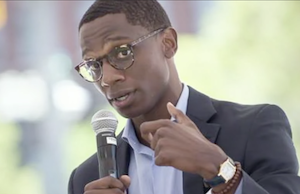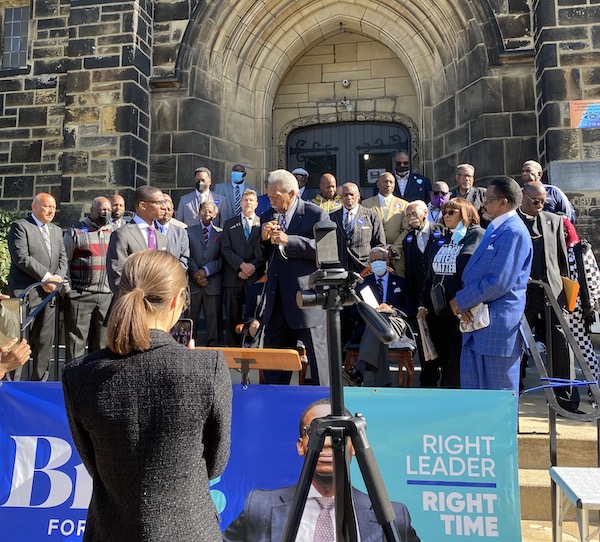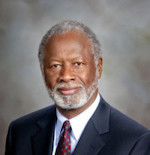ANALYSIS

Cuyahoga County Councilman Marty Sweeney
Cleveland’s mayoral politics have been uninspiring for so long that when a promising outsider comes along, observers may be tempted to apply unduly stringent, even unrealistic, standards.
That’s what happened a few days ago when county councilman Martin Sweeney endorsed newcomer Justin Bibb for mayor. A veteran politician with some unsavory aspects to his record, Sweeney was excoriated by some for having the temerity even to make an endorsement, while Bibb was interrogated via social media for not rejecting it.
The likelihood is that Sweeney was assaulted because his endorsement confounded expectations. Had he endorsed Kevin Kelley, no one would have batted an eye over one westside Irishman endorsing another westside Irishman. Historically they have often been allied politically, seemingly even as recently as January, when Kelley was suspected of cutting a deal to support Sweeney’s bid to be appointed to county council over a worthy young opponent and preempt a Sweeney return to Cleveland politics. Sweeney told me at the time there was no quid pro quo for Kelley’s support in that intraparty contest. His endorsement of Bibb over Kelley this past week would seem confirmation of what Sweeney told me.
Marty Sweeney makes nobody’s list of exemplary public officials. His judgment has been bad and off-putting on more than one occasion. His political style is old school even for Cleveland, which makes him both an unlikely and significant harbinger of a new day. But his electoral success as a Cleveland city councilman and state representative show that he knows how to connect with Cleveland voters. His secret is no secret: he knows how to talk to ordinary folk, he returns phone calls, and he is laser focused on constituent service. And to paraphrase a dear friend of mine, you always know where to find him on key issues.
These traits count when voters are deciding how to cast their ballots.
They also mean that Sweeney’s endorsement has value. We don’t know how large Sweeney’s band of loyalists is, but in a low turnout race that everybody is predicting, the Sweeney endorsement is likely to turn out for Bibb a contingent that might be otherwise be expected to support Kelley.
Why did Sweeney endorse Bibb? Most likely for a combination of reasons. The first is Sweeney thinks Bibb will win, and his instinct has him siding with the winner. Bibb won the primary, showing support in every part of town, including on Kelley’s turf.
Sweeney will be challenged next year when he runs for a full term as county councilman. He will have covered his city flanks if Bibb is mayor.
Sweeney has observed and respects the way Bibb has campaigned and believes he can work with him professionally.
And clearly, the presumption of an ironclad Kelley-Sweeney bond was inaccurate.
Big picture view
Looking at the entirety of the Cleveland political landscape, the Sweeney endorsement is fully in keeping with the way this election campaign has gone from the beginning. When Bibb announced his candidacy in January, hardly anyone in town outside his team saw the skinny looking, studious kid from the southeast part of town who had never run for or held office, or — as far as most people knew — even worked in a campaign, as having a ghost of a chance at surviving the primary, much less winning the entire enchilada.
Bibb not only survived the primary, but he won it going away, defeating five established politicians along the way, most of whose names have been on the ballot ever since an 18 year old Bibb first became eligible to vote.
There were many reasons Bibb did well in the primary. First and foremost, he knocked on doors early and often. Second, he understood there are voters in every single ward who want change and his team crafted a message that appeals to them, regardless of that voter’s age, location, status or race. Third, he assembled the tightest and most diverse team and ran a textbook campaign. And fourth, he raised enough money to be competitive.

Justin Bibb
Bibb’s authentic cross-racial appeal has been a refreshing surprise in this campaign. Our town’s politicians and most of its pundits are perplexed by it, attached as they are to traditional norms. The voters are more willing to take a chance on change. The political class is less willing to risk its standing on the premise that the lines of black and white and of east and west have become permeable, and as crooked as the river that has traditionally served as unbridgeable boundary.
Bibb is unapologetically black without making anyone feel uncomfortable about their whiteness, blueness, or chartreuse-ness.
That’s a greatly underrated attribute in these polarized times. It’s helped Bibb get endorsements just in the last two weeks from nearly every quarter. From Nina Turner, whose insufficiencies in that area torpedoed her candidacy in a Congressional primary that was hers for the taking. From state Sen. Nickie Antonio, who defeated Sweeney in their 2018 head to head primary and whose status as the first openly gay person to serve as a member of the Ohio legislature makes her more open to cross-boundary appeals. From state Sen. Sandra Williams, who trailed Bibb in virtually every ward in the primary but is smart enough to know which way the wind blows.
And now, Sweeney, who on paper represents the antithesis of black political interest.
Clevelanders have fought the irresistible winds of change for well-nigh ninety years. The result is huge areas of desolation, abandonment and despair all across our community. While the deterioration owing to decades of disinvestment and neglect is most noticeable on the east side, the losses are felt all over town, even if to varying degrees. Those losses are sufficiently palpable that Betty and Willie Voter recognize we need to change.

Black pastors hold press conference on Sept. 30 at Greater Friendship Baptist Church in Glenville area. Speaking is Pastor George O. Stewart of Zion Hill Missionary Baptist Church in Lee-Harvard, who baptized the infant Bibb and future mayoral candidate.
Now that even the bulk of black preachers have lined up behind Bibb, the ranks of those most resistant to change have largely dwindled to those allied with the safety forces and the trade unions — each with their long histories of exclusion and insularity — and a collection of ineffective black political apparatchiks who rightly sense their utility will be eclipsed by a Bibb victory.
Turnout by a depressed electorate worried about food and shelter will be key. Kelley has a dependable reservoir of core supporters who will show up Nov. 3. If a low turnout inclines to a close contest, the margin of victory might be rooted in the contingent guided to the Bibb column by the savvy Sweeney.
• • •• • •
















